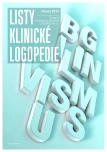-
Medical journals
- Career
RAISING THE LEVEL OF ATTENTION BY USING COGNIPLUS PROGRAM OF ADULT PATIENTS WITH TBI OR STROKE
Authors: PhDr. Dzidová Lenka
Authors‘ workplace: AquaKlim, s. r. o., Sanatoria Klimkovice, 742 84 Klimkovice, Česká republika
Published in: Listy klinické logopedie 2017; 1(1): 61-68
Category: Miscellaneous
Overview
We often meet individuals with diagnosis traumatic brain injury or stroke in clinical practice, whose passivity, fluctuations of attention and lack of motivation affect targeted intervention. Given these limitations it is desirable to connect the motor rehabilitation and partial rehabilitation of cognitive function - particularly attention. This contribution presents increasing levels of attention with the help of a computer program CogniPlus and a training module Alert. The research group consisted of 60 individuals diagnosed with TBI or stroke undergoing 5,10 or 15 therapies. The obtained data were statistically analyzed and processed using frequency tables, box plots with whiskers, Student‘s t-test and the Pearson correlation coefficient. The aim of the research was to determine whether there is improvement in the level of attention due to the increasing number of therapies depending on reaction time in individuals of both groups of diagnoses.
Keywords
traumatic brain injury; stroke; attention; computer; program
Sources
1. ASHA. Traumatic Brain Injury in Adults. [online]. 2016. [cit. 2017-04-08]. Dostupné z: www.asha.org
2. Bruthans, J. Epidemiologie cévních mozkových příhod. 2009. In: Remedia [online]. [cit. 2017-04-09]. Dostupné z: www.remedia.cz
3. CogniPlus. Katalog tréninkových programů. [online]. 2016a. [cit. 2017-04-04]. Dostupné z: Dostupné z: docplayer.cz
4. CogniPlus. Principy léčby kognitivních poruch vyplývajících z poškození mozku. [online]. 2016b. [cit. 2017-04-04]. Dostupné z: http://cz.asystems.as/produkty/schuhfried/cogniplus
5. Klucká, J., Volfová, P., 2016. Kognitivní trénink v praxi. Praha: Grada Publishing. ISBN 978-80-247-5580-9.
6. Kulišťák, P., 2003. Neuropsychologie. Praha: Portál, ISBN 80-7178-554-7.
7. Lippertová-Grünerová, M., 2005. Neurorehabilitace. Praha: Galén, ISBN 80-7262-317-6.
8. Lippertová-Grünerová, M., 2009. Trauma mozku a jeho rehabilitace. Praha: Galén, ISBN 978-80-7262-569-7.
9. Lišková, K. a kol., 2014. Neurorehabilitace: jak se zorientovat? Příručka pro osoby se získaným poškozením mozku a jejich rodiny. Praha: Erudis, o.p.s.
10. Neubauer, K., Skákalová, T., 2015. Poruchy komunikace u dospělých a stárnoucích osob. Hradec Králové: Gaudeamus, ISBN 978-80-7435-640-7.
11. Preiss, M. Neuropsychologie – základní témata. [online]. [cit. 2017-04-09]. Dostupné z: slideplayer.cz
12. Preiss, M., Křivohlavý, J., 2009. Trénování paměti a poznávacích schopností. Praha: Grada, ISBN 978-80-247-2738-7.
13. Preiss, M., Kučerová, H., et. al., 2006. Neuropsychologie v neurologii. Praha: Grada, ISBN 80-247-0843-4.
14. Roozenbeek, B., Maas, A., Menon, D. Changing patterns in the epidemiology of traumatic brain injury. 2013. In: Nature reviews neurology. [online]. Vol. 9., p.231-236 [cit. 2017-04-04]. Doi:10.1038/nrneurol.2013.22 Dostupné z: www.nature.com
15. Vágnerová, M., 2002. Psychopatologie pro pomáhající profese. 3. vyd. Praha: Portál. ISBN 80-7178-678-0.
Labels
Clinical speech therapy General practitioner for children and adolescents
Article was published inClinical speech therapy (Listy klinické logopedie)

2017 Issue 1-
All articles in this issue
- Bilingualism and education of children in a bilingual family
- The impact of changes in multilingual environment on child‘s speech development
- Expressive vocabulary of Czech-German bilingual child
- Primary language impairment in a context of multilingual society
- Selected myths in relation to bilingualism
- A nonword repetition ability as a complement to a family history of a child
- RAISING THE LEVEL OF ATTENTION BY USING COGNIPLUS PROGRAM OF ADULT PATIENTS WITH TBI OR STROKE
- Clinical speech therapy (Listy klinické logopedie)
- Journal archive
- Current issue
- Online only
- About the journal
Most read in this issue- Bilingualism and education of children in a bilingual family
- Selected myths in relation to bilingualism
- The impact of changes in multilingual environment on child‘s speech development
- A nonword repetition ability as a complement to a family history of a child
Login#ADS_BOTTOM_SCRIPTS#Forgotten passwordEnter the email address that you registered with. We will send you instructions on how to set a new password.
- Career

